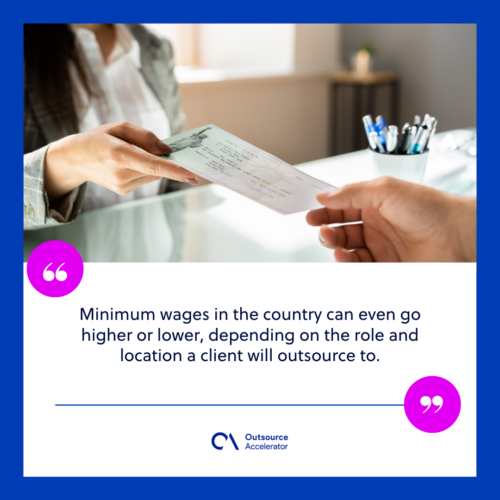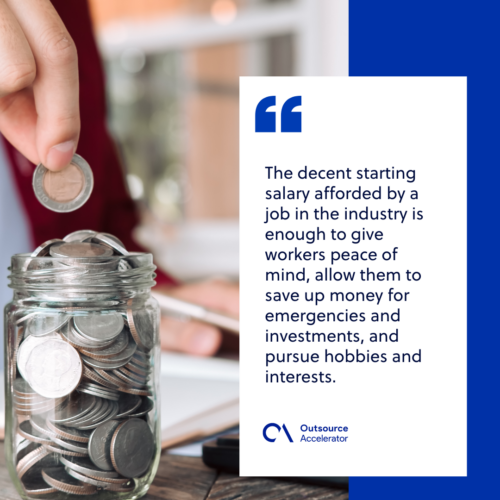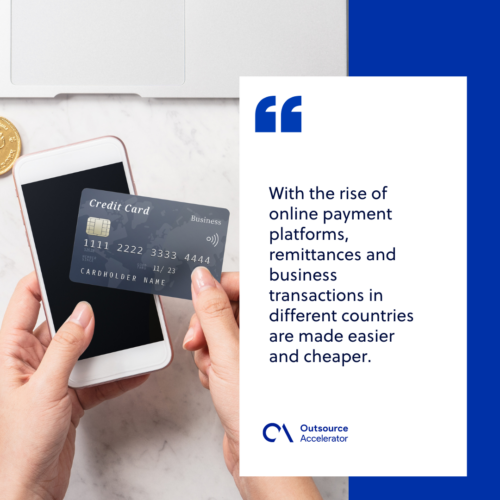UPDATE: COVID-19 is forcing companies to review their traditional staffing options. Read our dedicated COVID-19 articles here: COVID-19 Business Recovery Action Plan
Outsourcing work to the Philippines is always an excellent option for small to mid-sized companies that aim to get the most bang out for their buck.
The country’s low labor cost is always a point of interest for people who are looking to expand their operations. A reasonable average income for BPO employees in the country is now around $500 per month.
>>> Want to know more? Read the Ultimate Guide to Outsourcing
Compared to professionals based in developed countries like the USA and the UK, professionals in the Philippines earn a much lower annual salary — sometimes even 70% to 90% less — despite having the same responsibilities.
That may sound like it’s a bad thing, but it’s not; it’s actually a win-win situation for both the company and the outsourced labor force.
It’s only natural to wonder why a competitive workforce that’s fluent in English can be hired for pennies on the dollar. Rest assured, this is not because of exploitation or modern-day slavery.
These reprehensible acts are still practiced in many places around the globe, but the BPO industry in the Philippines has taken a solid stance against these and actively supports practices that provide employees with good working conditions and decent wages.
Note: A recent report from the World Trade Organization (WTO) highlighted the contribution of the BPO sector in the Philippines, which brings economic prosperity to the people. The report stated that the BPO sector has accounted for the 7.3% GDP growth of the country and has employed about 1.3 million workers in 2019 alone.
The average salary in the Philippines
Per the Philippine Statistics Authority (PSA)’s 2022 Occupational Wages Survey (OWS), the average monthly salary in the Philippines is PHP 18,423 (US$328.99). It is way cheaper compared to the average salary in India and its outsourcing markets, including the US and Australia.
Based on the latest data from Indeed, the following are the average monthly salary of workers in the Philippines. The data varies depending on the position or level of employment.
| Roles | Monthly Salary (in PHP) | Monthly Salary (in USD) |
| Maintenance and cleaning crew | PHP 14,145 | $253 |
| Service personnel (driver, cashier) | PHP 14,034 | $251 |
| Office clerk (entry-level) | PHP 15,165 | $271 |
| Security guard | PHP 17,029 | $304 |
| Construction worker | PHP 16,081 | $287 |
| Teachers | PHP 20,816 | $372 |
| BPO employees | PHP 27,999 | $500 |
| Licensed Professionals* | PHP 45,423+ | $893+ |
The average annual salary of Filipino professionals
Below is a chart showing the average annual salary in the Philippines (USD) for common professionalized roles based on data by Talent.com. Read more about salaries in our comprehensive salaries guide here.
| Job Title | Entry | Junior | Senior |
| Accountant | $6,202 | $7,802 | $12,857 |
| Call center agent | $4,714 | $5,572 | $7,500 |
| Copywriter | $5,357 | $6,697 | $9,965 |
| Graphic artist | $5,464 | $7,500 | $9,000 |
| HR manager | $7,500 | $10,179 | $15,000 |
| Project manager | $7,500 | $9,643 | $13,928 |
| SAP consultant | $10,447 | $12,322 | $16,447 |
| Software developer | $7,393 | $9,643 | $14,399 |
| Systems administrator | $5,357 | $8,572 | $13,331 |
| Systems analyst | $5,614 | $6,886 | $10,928 |
| Team leader | $6,429 | $7,500 | $12,214 |
| Technical support representative | $4,848 | $5,786 | $7,929 |
| Virtual assistant | $5,893 | $7,500 | $9,643 |
*Average annual salary in USD
Minimum wage in the country
The country does not implement a standard minimum wage across all provinces. Rather, it has a regional wage board that sets minimum wages in each province, including Metro Manila.
Minimum wages in the country can even go higher or lower, depending on the role and location a client will outsource to. Employees in the National Capital Region receive the highest salaries with workers earning up to PHP 537 (USD 10.45) per day.

How can a $500 average monthly salary in the Philippines work?
A developing nation in the Southeast Asian region, the Philippines has one of the lowest costs of living among its neighbors. Let’s take a look at how much a typical Filipino family needs for their daily living vs. how much they actually spend.
How much a Filipino family needs
A 2021 poverty statistics by the Philippine Statistics Authority (PSA) states that a family of five needs at least PHP 12,082 a month, or the equivalent of US$215, to meet their most basic food and non-food needs.
This means that for the average Filipino family, it can be possible to live comfortably month by month at US$500, given its low average salary.
How much a Filipino family spends
In another 2021 survey conducted by the PSA, it was revealed that a Filipino family typically spends USD 4,081 per year or USD 340 every month.
In comparison, the minimum wage in the country is equivalent to more than USD 10.45 per day or around USD 219 per 21-day work month, which isn’t exactly enough compared to the average annual family spending.
What this means
As shown in these statistics, there is a significant difference between the projected needs and the actual spending — but the bottom line is the minimum wage in the Philippines is simply not enough, especially for a family with only one breadwinner.
In many cases, one parent serves as the breadwinner while the other, usually the wife, stays at home to care for the household.
Meanwhile, it should be noted that a large majority of the jobs offered in the BPO industry pay above the minimum wage and provide employees with health benefits and various allowances.
The decent starting salary afforded by a job in the industry is enough to give workers peace of mind, allow them to save up money for emergencies and investments, and pursue hobbies and interests.

Factors that make a $500/mo salary work for Filipinos
While the average salary of US$500/month may seem little, it is actually an amount that allows many employees, especially in the BPO industry, to have a comfortable life.
There are many reasons why employers, including foreign investors, are able to offer this average salary. Here are the top factors that make $500 a good average salary for many Filipinos.
A strong sense of family
The Philippines generally has a strong sense of family and community. This is demonstrated by the number of Philippine holidays, national and local festivities, and the government-mandated 13th-month bonus (paid just before Christmas), which all employees receive.
Children are expected to live with their parents until they get married, and it’s not unusual to see multiple generations of a family living under the same roof.
Upon graduation, most Filipinos are expected to help support the rest of the family and care for their parents after they have retired. A US$500 monthly salary can help sustain their personal needs and help contribute to their families in return.
The high value that an individual places on the family plays a crucial role in the workplace. The need to ease the financial burden of the family motivates most employees to keep their job and perform well.
A big influx of young workers every year
After graduating, Filipino students seek salaried jobs as soon as possible to support their families.
This ensures a yearly influx of almost 800,000 fresh graduates willing to join the workforce. Many of them have received training in information technology and communication.
>>> Is outsourcing right for your business? Get a quote or book a consult
The national government, in coordination with BPO industry stakeholders and educational institutions, has continually pushed universities and colleges to offer Bachelor’s degree courses that will prepare students for a career in BPO.
In addition, many educational institutions also offer affordable short-term courses for those who want to work in the industry but don’t have the means to pursue a 4- or 5-year college degree.
At the end of every school year, many Bachelor’s degree graduates and certificate holders alike apply to BPO companies, particularly those that are based in cities.
The abundant supply of new and highly-skilled talents yearly, along with the country’s low living cost, can help companies afford a US$500 average salary and scale their teams better.

Fear of poverty
A developing country will always have some form of rampant poverty present within its borders, and the Philippines is no exception. With nearly 10 million families in the country considering themselves poor, it’s a serious problem.
Despite this – or perhaps, because of it – Filipino workers work hard. To live comfortably, to provide their families with essentials, and to afford their siblings the chance to make something better for themselves, they apply themselves to their work.
Of course, there are also driven individuals in the workforce who wish to advance in their careers and be recognized for their talents. These workers upskill by either taking a master’s degree, getting licensed, or taking up short courses.
This mindset comes into play when they gladly accept the workload that’s been given to them without complaint or sass. They keep their eyes on the prize even if the work is challenging, repetitive, or stressful – and this is true with many outsourced business processes, such as technical or customer support.
A US$500 average salary for BPO employees is NOT slavery
For a Filipino worker, a US$500 monthly salary is not slavery. Depending on the job at hand, of course, it can be a pretty decent amount that is enough to sustain a good way of life and afford more than the essential needs of a family.
This amount is a far cry from the monthly minimum wage of US$329, which some people argue can be too small to provide a family with nutritious food and cover rent, transportation, utilities, school, and other expenses within the same period.
The extra money that doesn’t go toward paying the expenses can be put in a savings account. It can even be used in furthering the employee’s education, turning them into another asset for the company, and giving them a better chance to improve their lives.

International transfer of salaries and payments
With the rise of online payment platforms, remittances and business transactions in different countries are made easier and cheaper.
One can already send payments in different currencies without the burden of excessive foreign exchange fees and a few weeks of waiting for the payment to be credited.
For your payment needs, you may opt for a global B2B payment solution where you can do money transfers instantly and hassle-free. It is perfect for freelancers, SMEs, and bigger companies alike who do transactions across the globe.

Outsourcing is a win-win solution
Hiring a Filipino workforce is a win-win choice for both your company and the Philippine-based BPO company, freelancer, or consultant that you are working with.
It allows your company to increase its bottom line and give decent work and wages to employees in the Philippines, as well as promote good working conditions in the BPO industry in the country.
The data above has shown how a US$500/month average salary helps a lot in improving a Filipino standard of living. On average, BPOs even provide a higher average salary in the Philippines compared to other industries. That’s not slavery at all; that’s empowerment.
As such, companies looking to outsource their business processes in the Philippines should not let themselves be hampered by any sort of misplaced guilt or hesitation.
If you’re ready to go ahead and leave your doubts behind, get in touch with us at Outsource Accelerator and we’ll get you started.
To get a better picture of how incomes and salaries work in the Philippines, check out our very own comprehensive salaries guide on the matter. You can also see how the typical Filipino employee’s salaries compare to those in the UK, US, and Australia here.

 Independent
Independent





















